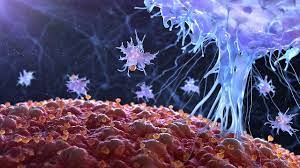One of the things that happens in chronic tick-borne illness (TBD) is immune dysregulation in both T cell and B cells. T cells mature in the thymus gland and are a form of white blood cell. T cell differentiation occurs in the thymus gland allowing for CD4 (T helper), CD8 (T suppressor), and CD57 cells to proliferate. These are the T cells that are most affected by TBD. The CD57 cells are the natural killer (NK) cells , and they act like, “scavengers” of anything that looks foreign in the blood. Lyme and co-infections cause significant immune suppression where the NK cell count becomes depressed, and patients are more susceptible to things like autoimmune disease and cancer. Nutritionals such as mushrooms, transfer factors, low dose naltrexone, peptides, clean diet and restful sleep can help return the CD57 cells back to normal (roughly 100).
B cells are made in the bone marrow, and produce antibodies (IgM and IgG). Antibodies “recognize” a pathogen and bind to it to help neutralize it. IgM indicates a current and recent infection by typical laboratory standards. Immune suppression from chronic infections can cause a reduction in antibodies resulting in a muted immune response. Frequently, patients will require intravenous immunoglobulin (IVIG) to restore antibody function to normal.

